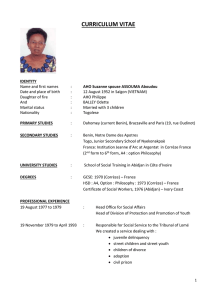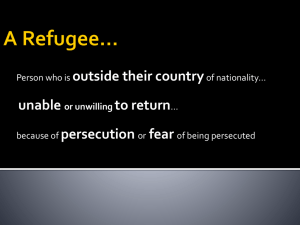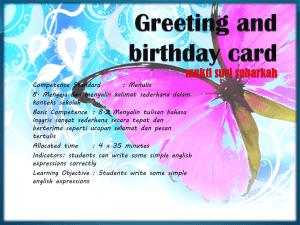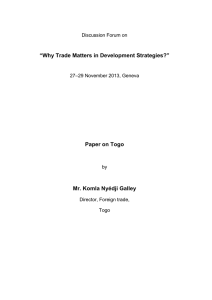Togo, Africa
advertisement
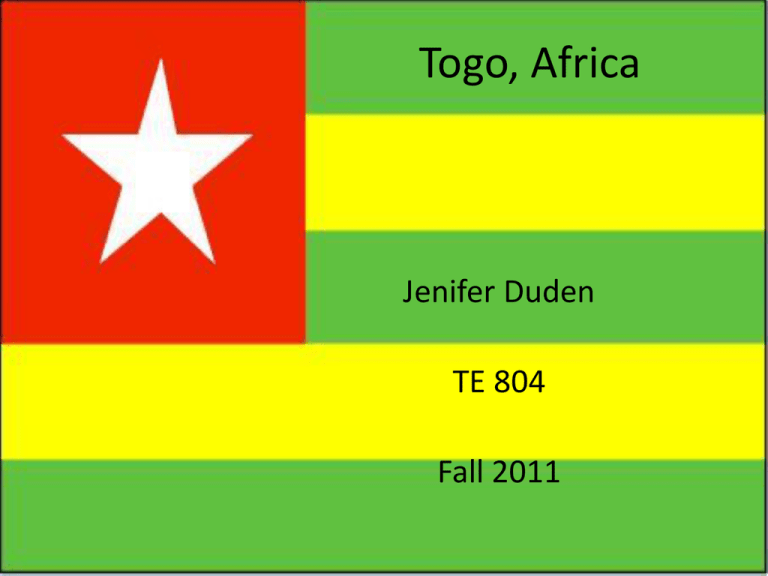
Togo, Africa Jenifer Duden TE 804 Fall 2011 Basic Information • • • • • • • Official Name Togolese Republic Population 6,458,605 Capital City Lomé (pop. 737,751) Currency CFA Franc Languages French (official), local dialects National Day 27 April, Independence Day Religions Muslim, Christian, locals beliefs Map PUBLIC HOLIDAYS 1st January New Year's Day 13th January Liberation Day 24th January Anniversary of failed attack at Sarakawa 24th April Day of Victory 27th April Independence Day 1st May Labour Day 15th August Assumption 24th September Anniversary of failed attack at Lomé 1st November All Saint's Day 25th December Christmas Day Movable Holidays Easter Monday and Variable Islamic Holidays Brief History • The Voltaic peoples and the Kwa were the earliest known inhabitants. The Ewe followed in the 14th century and the Ane in the 18th century. The Danish claimed the land in the 18th century, but by 1884 it was established as a German colony (Togoland). The area was split between the British and the French under League of Nations mandates after World War I and subsequently administered as UN trusteeships. The British portion voted for incorporation with Ghana. The French portion became Togo, which declared its independence on April 27, 1960. Personal Space • Generally an arm’s distance. • The more distance the more respect. • Men and women seldom touch in public. Greetings • Men greeting Men – A handshake with the right hand is the most common form of greeting. • Women greeting Women A handshake with the right hand is the most common form of greeting for formal and business situations. *When shaking hands it is respectful to place your left hand around the wrist of your right hand while shaking. You always use your right hand to shake. If your right hand is occupied when you need to shake you offer your right wrist, never your left hand. * Greetings • Greetings between Men and Women - A handshake with the right hand is the most common form of greeting for formal and business situations. *Note: Togo has 37 ethnic tribes, and greetings may differ greatly between them. Each local language has a standard dialogue of greetings that must be said out of respect (usually 6-8 questions and responses). When greeting someone in power like a chief everyone will get down on a knee and say the greeting together while the chief gives the standard answers. * Communication • The Togolese are seldom direct or state exactly what they mean. They’ll often say what they think you want to hear or what is expected to be said. It’s important to keep in mind the hierarchy of Togolese culture: men…women…children. Also, greater age usually implies greater respect. • Sarcasm doesn't tend to translate very well, especially when it comes to making jokes. Communication • People tend to be direct but polite in many situations, especially when it comes to personal appearance or attributes. Communication • Skin color is also a big standard. People don’t hesitate to announce your skin color in public if you are lighter skinned than they are, even if you’re black. This is culturally acceptable and not at all rude. Etiquette • Eat with Right Hand. When guests arrive, water is offered and the traditional greeting— asking about the family and their health— ensues. Eye Contact • In most areas eye contact is acceptable, but one must not stare blatantly into the other’s eyes. Eye Contact • A man may make eye contact with someone equal (another man) or lower than himself on the hierarchy (a woman or child) but it is usually only held if he is angry. In rural and tribal areas, women almost never make eye contact with men. View of Time • The expectation about time in is that there is no expectation. A meeting scheduled for 10 am means that most people will show up between 11 am and 12 pm, if they show at all. Things seldom happen “on time”. Gestures • The thumbs up sign is often used as a sign of congratulations or approval. • One the most common signals in is the “hiss” noise used to get someone’s attention. Gestures • To beckon someone you put your right hand up and open and close the fingers in a scratching motion. Be sure to always use the right hand. School Life • The primary education comprises of five years of basic education. The publics schools in Togo villages have a record of ill treating the children, which makes education a terror for them. School • Togo Schools are however out of reach for many children due to financial problems in the family. However 70% of the Togo children get education from the Government Schools. Sports • Togo Futball (soccer) is named as “Les Eperviers” Taboos • You must use your right hand for everything. The left hand is considered dirty and it’s extremely rude to offer your left hand or use it to beckon someone. • If your right hand is occupied when you need to shake you offer your right wrist, never your left hand. Taboos • It is considered rude to smell food that has been prepared for you or ask what it is exactly that you’re eating. A meal prepared for you is a big deal in a starving country and you should accept it gratefully and without question. Works Cited • http://www.infoplease.com/ipa/A0108038.ht ml • http://www.worldatlas.com/webimage/countr ys/africa/tg.htm • http://www.africaguide.com/country/togo/in dex.htm • http://www.everyculture.com/To-Z/Togo.html • http://www.holyspiritelca.org/HUMAN%20NEEDS/peacecorp.html Works Cited • www.wn.com • http://www.wsscc.org/countries/africa/togo/ wash-coalition-overview • www.sgi.org • http://www.world66.com/africa/ghana/lib/gal lery/showimage?pic=africa/ghana/people_eat ing_fufu • http://members.virtualtourist.com/m/272f3/1 001/
